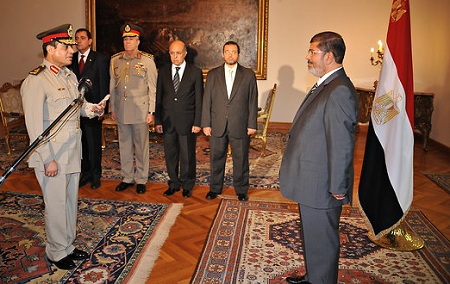Of course, the significance of the decision by Egyptian president Mohammed Morsi on Sunday to announce the resignation of not just Field Marshal Hussein Tantawi as defense minister, but his deputy, General Sami Anan, cannot be understated.![]()
It is easily the most significant moment in Egyptian governance since Morsi’s election — and it, surprisingly, comes just over a week after Morsi’s first cabinet was sworn in — a cabinet that seemed destined to feature Egypt’s military, with little civilian participation from beyond the Muslim Brotherhood and its sphere of allies.
But it also comes very soon after Morsi fired his intelligence chief in the wake of increased attacks and a growing Islamic fundamentalist threat on the Egypt-Israel border in Sinai.
Tantawi, the leader of the Supreme Council of the Armed Forces that led Egypt’s transitional government between the fall of Hosni Mubarak and Morsi’s election, has essentially been the head of Egypt’s military since his appointment as secretary of defense in 1991. His reappointment as defense secretary in the cabinet of Morsi’s prime minister, Hisham Qandil, was seen as a sign that the Egyptian military had reached somewhat of an uneasy truce with Morsi — Morsi may be the elected president, but the military would have enough residual power to veto Morsi on key issues, especially where national security is involved.
That changed Sunday — and the Tantawi and Anan retirements are not all that Morsi (pictured above, right)accomplished.
Morsi amended the last-minute June 17 declaration by SCAF that has attempted to limit presidential powers; instead, Morsi issued a new Constitutional Declaration that gives the president full executive and legislative authority, as well as power to set Egyptian public policy and sign international treaties. He also appointed Mahmoud Mekki, a respected deputy head of the Cassation Court, as his vice president (although in doing so, Morsi seemed to break a promise to appoint a woman and a Coptic Christian as his vice presidents).
Morsi appointed as the new defense minister a little-known general, Abdel-Fattah El-Sisi (pictured above, far left). In a profile today, Al Ahram noted that the 57-year-old El-Sisi, who previously served as Egypt’s military attaché to Saudi Arabia, will be the first Egyptian defense minister who also doesn’t hold the title of field marshal. El-Sisi is best known internationally as the general who announced that the military had conducted virginity tests on female protestors at Tahrir Square in order to prove soldiers had not raped them. SCAF subsequently backtracked on El-Sisi’s somewhat embarrassing statement.
Much of Egypt’s independent media and figures such as Mohamed ElBaradei have welcomed Morsi’s move. A wide spectrum, from youth protest leaders to Salafists are applauding what seems to be a bona-fide transfer of power from the military to the civilian president.
Mark Lynch at Foreign Policy dubbed Egypt’s president “Lamborhini Morsi” and offers three alternative (not incompatible) takes:
Those who believe the SCAF remains fully in control see a clever scheme to cement long-term military rule in alliance with the Muslim Brotherhood by gently dumping the unpopular figureheads while retaining an institutional hold on power. Those who fear the Muslim Brotherhood see the makings of a full-scale Ikhwanization of Egypt, with Morsi seizing dictatorial powers, brushing aside the secular bastion of the SCAF, and putting himself in place to shape the new constitution. And those who still see the prospect for some kind of real democratic transition can find some comfort in an elected President removing the senior leaders of the outgoing military junta without a bloody fight and asserting the principle of political control by an elected President.
As Lynch notes, “that the current phase of Egyptian politics is going to be a long, grinding institutional war of position,” pointing to the lack of legitimate institutions.
Egypt’s parliament remains suspended pending new elections, after the Supreme Court invalidated it shortly before the June presidential runoff. Furthermore, the Constituent Assembly appointed to draft a new constitution has yet to produce a draft constitution, which means that the powers of the Egyptian president are not yet even defined.
It’s far from the final battle between the secular military “deep state” and Islamist civilian leaders in Egypt, and Morsi has only just begun to turn to his most pressing domestic problem: how to transform a stagnant economy in the Arab world’s most populous country.
But Morsi’s Sunday maneuvers are a clear turning point away from a military-dominated Egypt — and one that much of Egyptian civil society is initially welcoming

7 thoughts on “Morsi, in firing defense minister, asserts presidential control over Egypt”